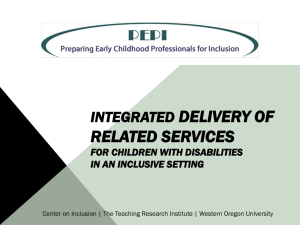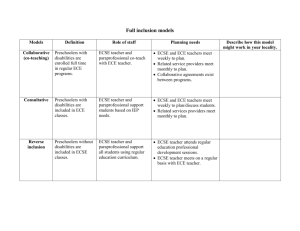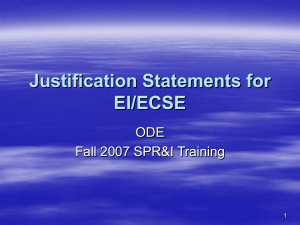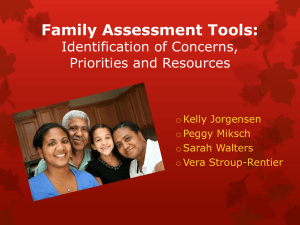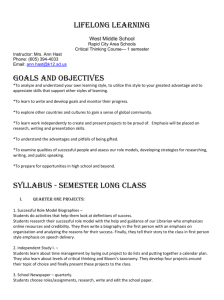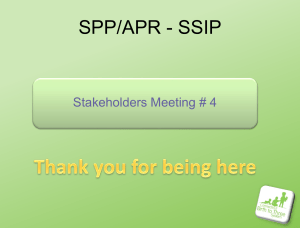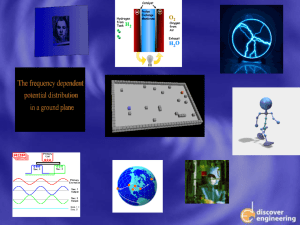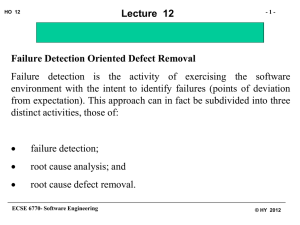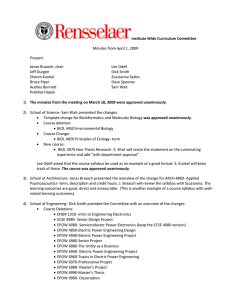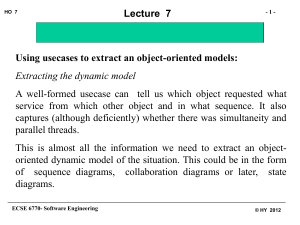Special Education, Early Childhood Special Education
advertisement
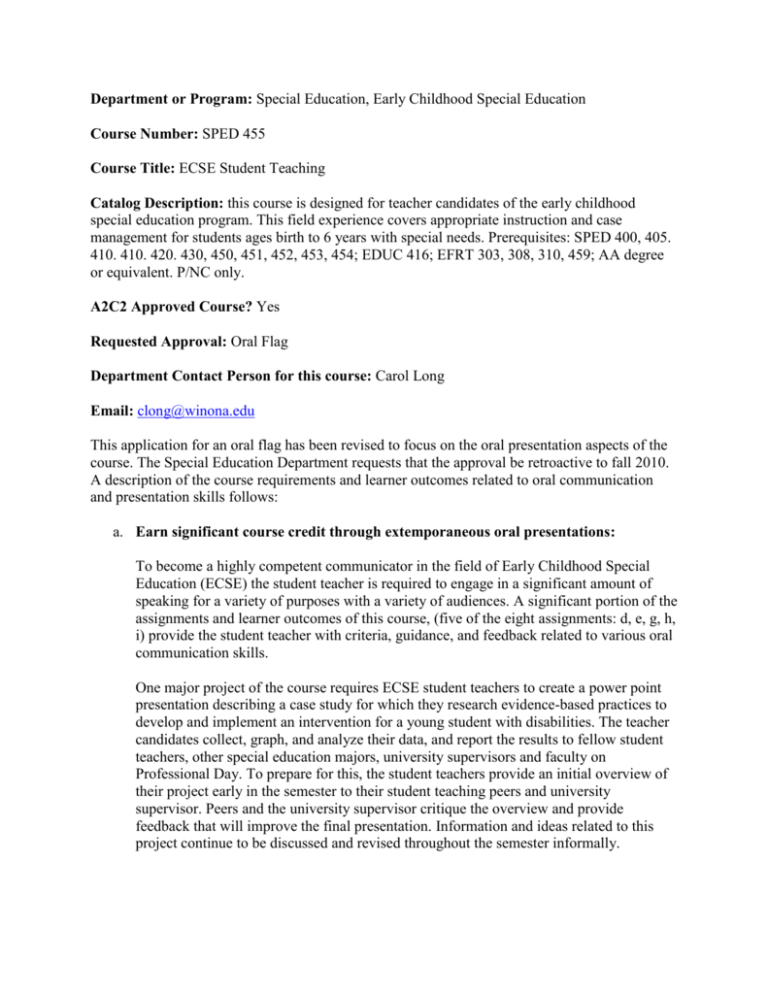
Department or Program: Special Education, Early Childhood Special Education Course Number: SPED 455 Course Title: ECSE Student Teaching Catalog Description: this course is designed for teacher candidates of the early childhood special education program. This field experience covers appropriate instruction and case management for students ages birth to 6 years with special needs. Prerequisites: SPED 400, 405. 410. 410. 420. 430, 450, 451, 452, 453, 454; EDUC 416; EFRT 303, 308, 310, 459; AA degree or equivalent. P/NC only. A2C2 Approved Course? Yes Requested Approval: Oral Flag Department Contact Person for this course: Carol Long Email: clong@winona.edu This application for an oral flag has been revised to focus on the oral presentation aspects of the course. The Special Education Department requests that the approval be retroactive to fall 2010. A description of the course requirements and learner outcomes related to oral communication and presentation skills follows: a. Earn significant course credit through extemporaneous oral presentations: To become a highly competent communicator in the field of Early Childhood Special Education (ECSE) the student teacher is required to engage in a significant amount of speaking for a variety of purposes with a variety of audiences. A significant portion of the assignments and learner outcomes of this course, (five of the eight assignments: d, e, g, h, i) provide the student teacher with criteria, guidance, and feedback related to various oral communication skills. One major project of the course requires ECSE student teachers to create a power point presentation describing a case study for which they research evidence-based practices to develop and implement an intervention for a young student with disabilities. The teacher candidates collect, graph, and analyze their data, and report the results to fellow student teachers, other special education majors, university supervisors and faculty on Professional Day. To prepare for this, the student teachers provide an initial overview of their project early in the semester to their student teaching peers and university supervisor. Peers and the university supervisor critique the overview and provide feedback that will improve the final presentation. Information and ideas related to this project continue to be discussed and revised throughout the semester informally. Two other major assignments requiring that student teachers present evidence based materials to an audience involve their facilitation and participation in Assessment Summary and IFSP meetings. The student teachers observe Assessment Summary and IFSP meetings and then reflect on, discuss, and practice presenting information. Criteria and guidance for collecting and reporting appropriate assessment data, and results are provided by the cooperating teacher and the university supervisor prior to the student teacher facilitating the assessment and IFSP team meetings. b. Understand the features and types of speaking in their disciplines: ECSE student teachers are required to demonstrate appropriate oral communication skills in every aspect of the student teaching experience; particularly as they present assessment results and recommend interventions at the IFSP meeting. The student teacher prepares an agenda and discussion points prior to the IFSP meeting and facilitates team discussion of each component of the plan during the meeting. The student teachers learn and practice appropriate communication techniques to assist the family in understanding assessment results, planning for transitions, and making choices that impact academic decisions. The intervention case-study presentation at the end of the semester involves a power point presentation and appropriate use of technical vocabulary involved in the evaluation, intervention research, data collection, and analysis. An overview is presented early in the semester; faculty and peers critique the presentation plan and make suggestions to enhance the final presentation. The final presentation is made to other student teachers, special education majors, and faculty. c. Adapt their speaking to field-specific audiences: Student teachers in the ECSE program are required to demonstrate their ability to differentiate the needs of their audience and the purposes of communication as they use their oral communication skills. Assignments in which the student teacher specifically demonstrates her/his skills include facilitating an Assessment Summary meeting, an IFSP meeting, and presenting an evidence-based intervention at Professional Day. At the Assessment and IFSP meetings the student teacher will present assessment results and explain the impact of the data on instructional planning to parents and professionals who work with the young child with disabilities. These team meetings include parents, school administrators, teachers, and other professionals who provide services to the young child with disabilities. For the intervention case-study presentation the student teacher prepares a power point describing the intervention, the type of data collected, and the effectiveness of the intervention. These presentations are given to student teaching peers, special education majors, and university faculty. d. Receive appropriate feedback from teachers & peers, including suggestions for improvement: At about midterm in the semester the student teachers present an overview of their proposed intervention case-study to their peers and university supervisor. The presenter is provided with suggestions which help them clarify and enhance their content and materials for the final presentation on Professional Day. Students informally share information and revise their work throughout the semester. The cooperating teacher and university supervisor explain criteria and provide guidance as the student teacher prepares for the Assessment and IFSP meetings. Follow up discussion provides the student teacher with feedback to improve facilitation of subsequent meetings. e. Make use of the technologies used for research and speaking in the fields. To develop appropriate evidence-based interventions the ECSE teacher candidates practice using appropriate web sites to find scientific research-based interventions to use in the teaching of their students. They use computer programs, such as SPEDFORMS to write assessment summary reports and IFSPs. The student teacher candidates create a power point presentation describing a case study in which they implement an intervention, collect, graph, and their analyze data, and report the results to fellow student teachers and other special education majors on Professional Day. (assignments b, c, d, e, g) f. Learn the conventions of evidence, format, usage, and documentation in their fields. ECSE student teachers practice various skills required to conduct special education assessments in which they collect evidence to document student eligibility for services under the Individuals with Disabilities Education Act. They contribute to the full assessment team summary report. They use the assessment data to plan appropriate instruction and interventions for infants and toddlers with disabilities. All of these activities become part of the intervention case-study presented in the final project. Throughout each step of the process the cooperating teacher and university supervisor guide and critique the work of the student teacher. Additionally, the student teachers are encouraged to work with peers to evaluate, edit and revise their presentations throughout the semester. At midterm all ECSE student teachers present overviews and provide feedback to one another to clarify and enhance the final presentations (assignments a, b, c, d).
